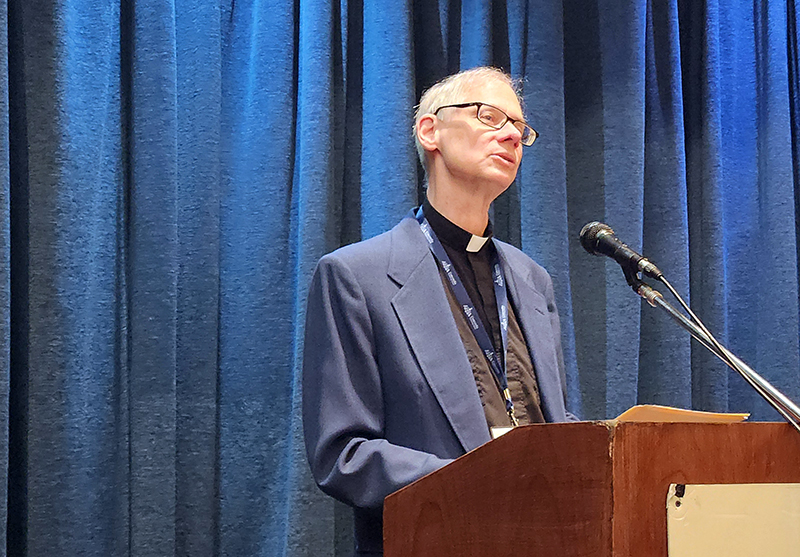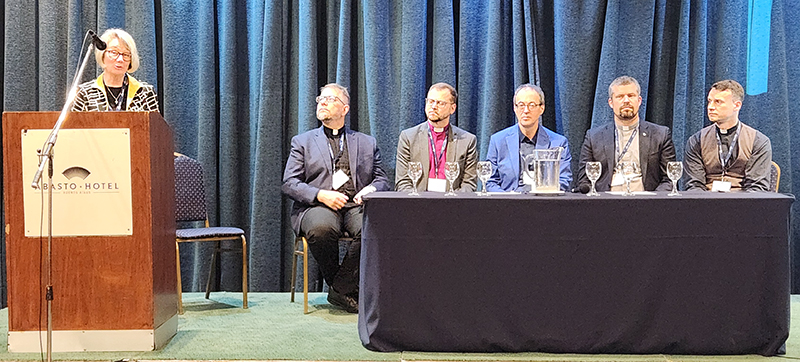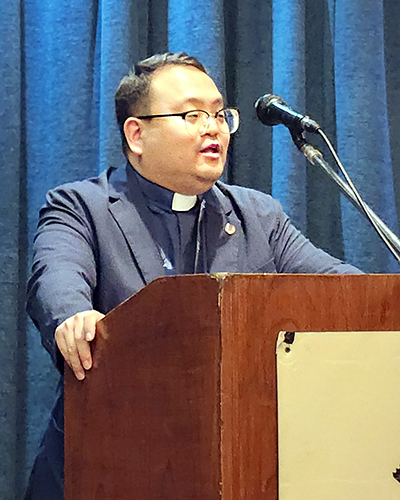
ARGENTINA – The International Lutheran Council’s (ILC) 2024 World Seminaries Conference continued during the morning of June 12, addressing the issue of government interference in seminary education.
The morning began with a service of Matins, with Rev. Dr. Jun-Hyun Kim preaching. A lecture followed, with Rev. Dr. James A. Kellerman of Canada’s Concordia Lutheran Theological Seminary (St. Catharines, Ontario) speaking. Dr. Kellerman discussed the challenges which face seminaries in terms of government interference. “Yes, seminaries are attacked and closed by governments,” he said. “But such events usually occur under regimes hostile to the idea of freedom of religion.” And even then, it is more common for pastor and members of local congregations to face anti-Christian persecution, not “a seminary located five hundred kilometres away.”
Still, the decline of religiosity and increase in secularization in places like Canada raise concerns for seminary education. Immigration holds back that secularization in part, since many immigrants “are more religious than native-born Canadians,” Dr. Kellerman noted. But their children are generally expected to adopt “secular values and become as indifferent to religion as native-born Canadians are.” With the decline in religion, then, seminaries and religious colleges in Canada continue to decline. “Canada is a perfect storm of secularism,” Dr. Kellerman explained. “Actual practice of religion (and especially Christianity) has sharply declined. Religion plays a small role in post-secondary education and none in politics. And everywhere you turn, you find virulent anti-Christian propaganda.”
Canadian law recognizes religion as a fundamental freedom, including its communal, public, and educational aspects, among others. But the existence of Canada’s notwithstanding clause means governments can theoretically suspend these rights—something notably done in Quebec with its Act Respecting the Laicity of the People, which bans government employees (including teachers) from wearing religious items of clothing, headgear, or jewelry. “The law underscores Quebec’s hostility to religion in the public sphere,” Dr. Kellerman noted, “but it does not directly interfere with church or seminary operations.”
There have also been worrying changes in prominent court cases touching on religious education. In 2001, for example, the Supreme Court of Canada ruled that graduates from a teaching education program at Trinity Western University (an Evangelical college) could not be banned by the province. But in 2018, however, the Supreme Court ruled against the same university when it attempted to open a law school, permitting provincial law societies from banning graduates from the program.

A different case ruled that religious schools could not be forced to teach its own faith in an “objective”—which is to say, secular—manner. “Seminaries can take heart,” Dr. Kellerman said. “If even [religious elementary and secondary] schools have the right to teach their faith in a non-neutral manner, how much more seminaries have that right.” Nevertheless, the cases against Trinity Western University in 2018 are a symptom of the religious atmosphere in Canada. Seminaries may not be called “to train students to serve in the public sphere,” he noted, but the rulings “underscore the secularization that the North Atlantic world is experiencing.”
“Seminaries in strongly secular countries do not necessarily face a great threat from direct government interference,” Dr. Kellerman says. But there is danger from other groups that “may have no legal authority but can muster great power.” For example, academic unions protest the right of religious institutions to require faculty to teach in accordance with the institution’s religious beliefs. A prominent union has expressly called on public universities to reject partnerships with any academic institution which requires its faculty to teach in conformity with a religious creed—a real concern for the numerous Christian seminaries in Canada which are housed on the grounds of public universities. So even when government is not actively interfering in seminary education, there may be other forces in the wider culture that threaten them.
“Part of our task as seminaries is to train pastors to guide their flock in a world increasingly hostile to the Christian faith,” Dr. Kellerman concluded. “But, at the same time, we can rejoice and thank God that extreme secularization has not yet meant the government prevents seminaries from fulfilling their calling.”
Plenary discussion followed, during which seminary representatives discussed other aspects of potential government interference in seminary education around the world.
Asia and Europe report
The morning also featured regional reports from representatives in the ILC’s Asia and Europe world regions.
The Asia region went first, with representatives speaking on the state of Lutheran theological education in India, Taiwan, and South Korea. Rev. Dr. P. R. Selvaraj, Principal of India’s Concordia Theological Seminary, Nagercoil, discussed the history and current status of their institution, which is celebrating its 100th anniversary this year. Rev. Dr. Tom Park, a theological educator from The Lutheran Church—Missouri Synod, discussed the situation in Taiwan, where confessional Lutherans are exploring establishing their own seminary. And Rev. Dr. Jun-Hyun Kim discussed the growth of the South Korean church’s Luther University.

The Europe region reported next, with Dr. Cynthia Lumley of Westfield House, Cambridge in England providing a summary report outlining common challenges and opportunities seminaries in Europe are facing. Representatives of each of the six seminaries present then provided additional comment on their own institution’s current status: Rev. Dr. Alexey Streltsov, Rector of the Lutheran Theological Seminary in Russia; Rt. Rev. Rinald Grants of Luther Academy in Latvia; Rev. Dr. Gilberto da Silva of Lutherische Theologische Hochschule in Germany; Rev. Sakarias Ingolfsson of AdFontes in Norway and Iceland; Rev. Constantin Subbotin of the Ingrian church’s Theological Institute in Russia; and Dr. Lumley for Westfield House in England.
———————
Find more news on the ILC’s 2024 World Seminaries Conference here.


